

Science Experiments with Eggs. Introducing the Scientific Method Teach the scientific method to ELLs byconducting science experiments in your ESL class.
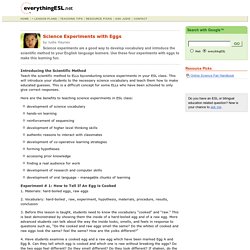
This will introduce your students to the necessary science vocabulary and teach them how to make educated guesses. This is a difficult concept for some ELLs who have been schooled to only give correct responses. Using Science to Develop ELLs' Language Skills. Grade Levels: 1 – 5 Subject: Science "Oh, you mean the life cycle.
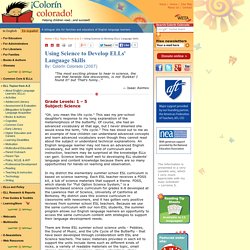
" This was my pre-school daughter's response to my long explanation of the metamorphosis of the butterfly. Of course, she had an advanced vocabulary at that age, but I never dreamed she would know the term, "life cycle. " This has stood out to me as an example of how children can understand advanced concepts and learn advanced vocabulary even though they cannot read about the subject or understand technical explanations.
An English language learner may not have an advanced English vocabulary, but with the right kind of curriculum and instruction, teachers may be surprised at the knowledge ELLs can gain. In my district the elementary summer school ESL curriculum is based on science learning. There are three ESL summer school science units - Pebbles, the Sound of Music, and the Life Cycle of the Butterfly - that have been developed through collaboration with ESL and Science teachers. The Butterfly Unit Graphic Organizers. Science Activities for All Ages! 3%20IPSE%20Volume%201%20No%201%20Wynne%20Harlen%20p%205%20-%2019.pdf. Professional Development: "Sciencing" and Young Children. Leadership - A Special Section For Administrators Science is more manageable, and more exciting, when you consider it to be a process of learning right alongside children!
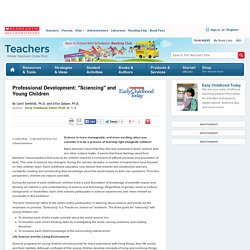
Many teachers report that they feel less prepared to teach science than any other subject matter. It seems that these feelings result from teachers' misconceptions that science for children requires a command of difficult concepts and acquisition of facts. This view of science has changed. During the last two decades, a number of researchers have focused on how children learn. During the period of early childhood, children build a solid foundation of knowledge of scientific inquiry and develop an interest in and understanding of science and technology. The term "sciencing" refers to the child's active participation in learning about science and points out the emphasis on process. Life Science and the Living Environment Physical Science, the Physical Setting, and the Designed World. Science Activities, Science Experiments and Simple Science Experiments.
Fun Science Activities for Kids – Easy Experiments. Fun Science Activities That are Safe and Easy Our fun science activities for kids will provide hours of learning enjoyment for your children, safely allowing their curious minds to explore different science experiments and projects.
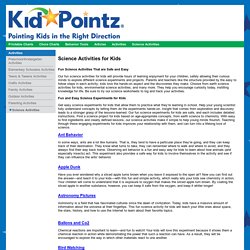
Parents and teachers like the structure provided by the easy to follow steps in each activity; kids love the hands-on aspect and the discoveries they make. Choose from earth science activities for kids, environmental science activities, and many more. They help you encourage curiosity today, instilling knowledge for life. Science Experiments for Kids. Crafts, Projects, Science Experiments, and Recipes for Moms with Young Children - Funology.
20 Science Projects for Preschoolers. I used to think science was above the heads of preschool aged children until I became the science parent at my children’s coop preschool and saw just how wrong I was!
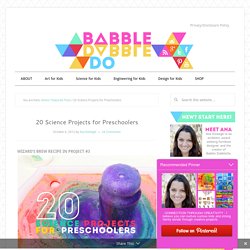
Some of the best preschool activities are science related. Preschool age children are inquisitive and open-minded, perfect traits for budding young scientists! Science at a preschool level is a lot of fun, kids are truly mesmerized by chemical reactions, love exploring nature, and jump to build things. Doing Science with Young Children. Children are invited to express their innate curiosity about the living things, objects and materials, and events in the world around them.
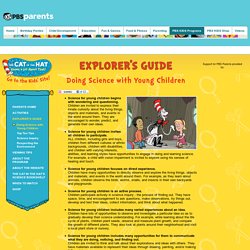
They are encouraged to wonder, predict, and generate their own ideas. ALL children, including girls and boys, children from different cultures or ethnic backgrounds, children with disabilities, and children with varying interests, abilities, and learning styles have opportunities to engage in doing and learning science. For example, a child with vision impairment is invited to explore using his senses of hearing and touch. Children have many opportunities to directly observe and explore the living things, objects and materials, and events in the world around them. Science_Concepts_Young_Children_Learn_Through_Water_Play_Carol_M_Gross.pdf. Earlychildhood NEWS - Article Reading Center. Do you know a child who is not completely full of questions?
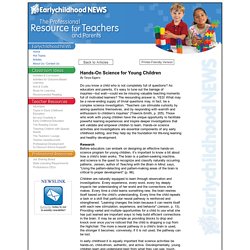
As educators and parents, it’s easy to tune out the barrage of inquiries—but wait—could we be missing valuable teaching moments full of motivated learners? The resounding answer is, YES! What may be a never-ending supply of trivial questions may, in fact, be a complex science investigation. Science_in_the_air. DavidSuzuki-OceanKeepers-KidsEventKit.pdf. Fizzy_Rocket_and_Water_Bottle_Rocke_4015337FADE5C.pdf. Lesson4. Explore Sound - Teachers & Parents. Students experiment with various sound sources, including their own voices, to gain an understanding of the connection between sound and vibration.
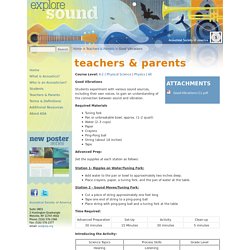
Required Materials Tuning fork Pan or unbreakable bowl, approx. (1–2 quart) Water (2–3 cups) Paper Crayons Ping-Pong ball String (about 18 inches) Tape Advanced Prep: Set the supplies at each station as follows: Station 1– Ripples on Water/Tuning Fork: Add water to the pan or bowl to approximately two inches deep. Time Required: Introducing the Activity: Begin with an introductory, interactive demonstration in which students feel the vibrations created by their own voices. We are going to feel the movement made by our voices when we talk, sing, hum, or shout.
Strike a tuning fork against a book and dip the fork in the pan or bowl of water. Station 2 – Sound Moves: Have one student in a standing position hold the string with the ping-pong ball at arm’s length. Ask the students the questions in bold and facilitate an open ended discussion. 40 Cool Science Experiments on the Web. Perhaps you don't have enough class periods to do every science experiment you wish you could, or maybe your budget for beakers and baking soda is all tapped out.
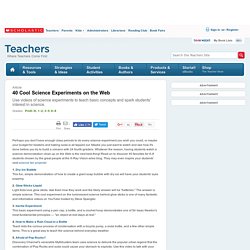
Maybe you just want to watch and see how it's done before you try to build a volcano with 24 fourth-graders. Whatever the reason, having students watch a science demonstration close up on the Web is the next best thing! Read on to discover 40 favorites for K-8 students chosen by the great people at the X-Ray Vision-aries blog. Science Experiments And Favourite Science Activities. Easy Science Experiments You Can Do at Home or at School. Fun Science Experiments for Kids - Cool Projects & Easy Ideas for Children. Water Math & Science Activities for Kids Ages 3-6.